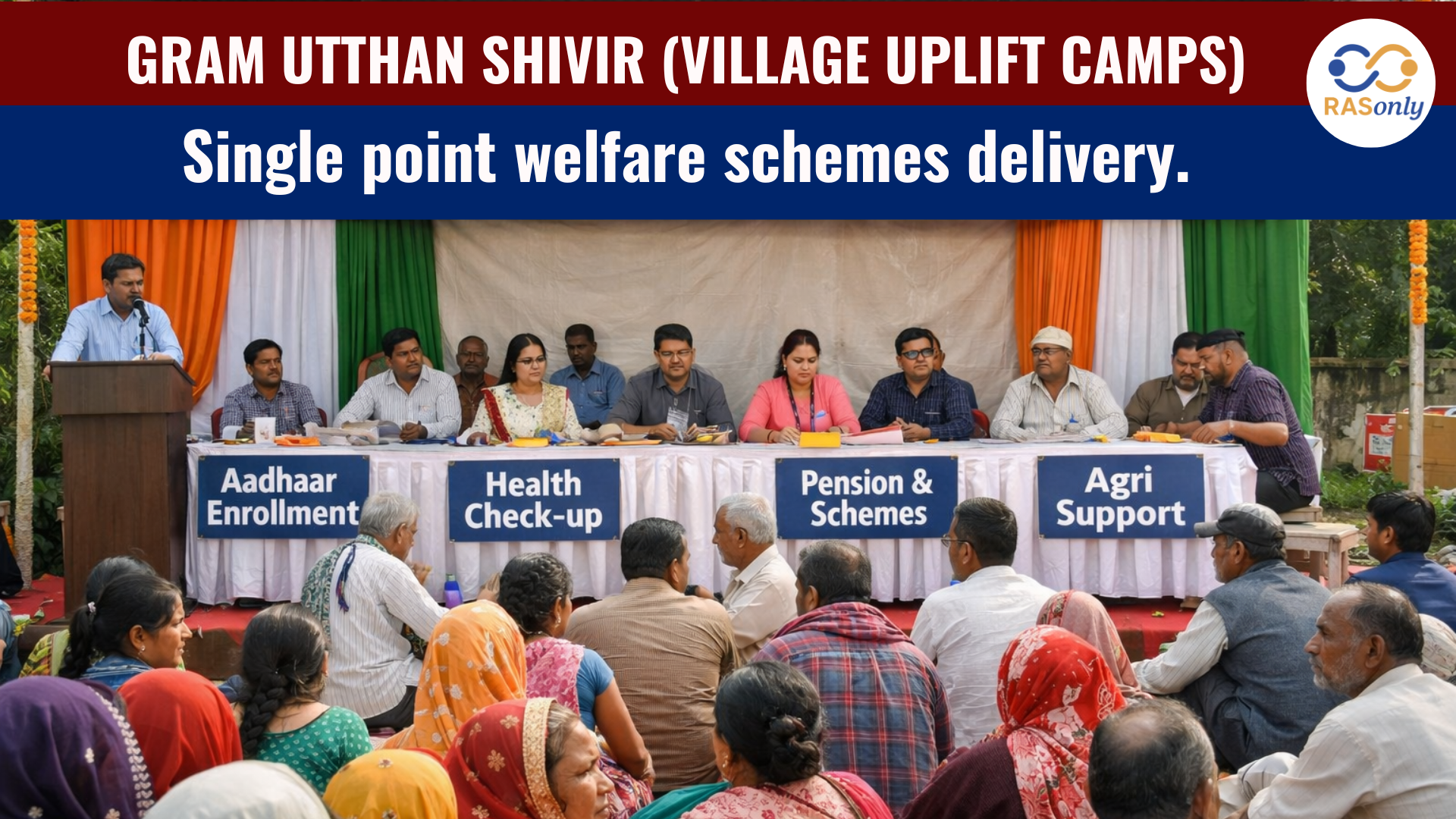RPSC RAS 2026 Subject Wise Exam Pattern for Prelims, Mains & Interview Details
- >
- RAS Preparation Resources
- >
- Karma- Concept in Indian Philosophy
Karma- Concept in Indian Philosophy

Get in Touch with RASonly!


Karma is the law of cause and effect enacted in the world of the Indians which governs the future conditions of a person calculated on his/her actions, or, according to the Sanskrit karman, an act. First of all, it developed as a moral value since it began in the form of ritual action as part of Vedic period and it is now prevalent in Hinduism, Buddhism, and Jains. It works independently, without God interference, and the actions are connected to the results over the lifetimes. Conjoined to dharma, it is the path to ethics of living and spiritual evolution. The notions operate as a moral incentive and a statement of understanding as to why human beings suffered in the rebirth cycle.
Key Points for RAS Mains
What is Karma?
- Meaning: The Sanskrit word karman (Pali: kamma) means “act” or “deed”.
- Definition:In Indian religion and philosophy, karma is the universal causal law by which good or bad actions determine future modes of existence.
- Significance: It plays a central role in Hinduism, Buddhist and Jain religion, as an ethical concept associated with rebirth (samsara) and liberation (moksha).
- Function
- Motivates moral living.
- Explains the existence of suffering and evil.
Historical Development
- Vedic Period (1000-700 BCE)
- Originally karma was used to refer to sacrificial and ritual activities.
- Perceived as an independent ritual law working independent of the will of Deity.
- Upanishad Period (Middle 1st Millennium BCE)
- Spread out to the ethical arena.
- Yajnavalkya: Through good action man becomes something good and with bad action he becomes bad.
- Increasingly, the moral aspect was starting to become more dominant but at the cost of purely ritualistic aspects.
- Buddhist and Jainism
- Denied priestly ritualism; interested in moral and ascetic life.
- Made karma a self-governing moral law.
Philosophical nature of Karma
- Causal Law: Acts mechanically without god working (nontheistic theodicy).
- Act & Effect association:
- Jainism: Karma are fine particles of matter which cling to the soul (jiva), and weigh it down during re-incarnation.
- Vedic Tradition: apurva, latent potency of action, which manifests itself in future.
- Yoga & Buddhism Psychological residues (samskaras, vasanas) influence future tendencies.
Key Principles
- Individual Responsibility:
- Karma that is involved tends to affect oneself.
- Popular Belief: Karma Transfer:
- Merit transfer: Good karma can be transferred (e.g., Buddhist/Hindu rituals, pilgrimages).
- Offerings to the ancestors to realize the health of the spirits.
Social Relation with Dharma
- In Hinduism:
- Dharma = Moral & religious law.
- Two forms:
- Universal duties (truth, non-violence, generosity) Sadharana Dharma.
- Svadharma- prescriptions according to caste, stage of life or occupation.
- In Buddhism:
- Dharma = cosmic truth as given by Buddha.
- One of the three refuges (Triratna) which are Buddha, Dharma, and Sangha.
- In plural (dharmas): Elements of reality.
Moral thought in India Significance
- Describes moral order which is not arbitrarily divine.
- Comes to promote ethical life towards improved rebirth or liberation.
- Combines cosmology and moral causality.
Conclusion
Karma of Indian thought developed as an element of ritual in the technological process and became a universal moral law that determines personal fate. It is also connected to dharma in order to govern ethical behavior and spiritual improvement. The fact that it is spread in all the religions of Hinduism, Buddhism, and Jainism helps to emphasize its main importance in the Indian worldview.
Also Read: Communalism in India
Post Category
- RAS Salary
- Result
- RAS Admit Card
- RAS Job
- RAS Cutoff
- Preparation Tips
- RAS Answer Key
- RAS Exam Analysis
- RAS Syllabus
- RAS Previous Year Papers
- RPSC RAS Exam Pattern
- RAS Interview
- RAS Mains Exam Date
- RAS Vacancy
- RAS Test Series
- RAS Best Books
- RAS Preparation Resources
- RAS Coaching Centre
- History
- Polity
- Geography
- Economics
- Science
- Art and Culture
- RPSC RAS Application Form
- RPSC RAS Notification
RASonly Interview Guidance Program

Mr. Ashok Jain
Ex-Chief Secretary Govt of Rajasthan
- IAS officer of the 1981 batch, Rajasthan cadre.
- Passionate about mentoring the next generation of RAS officers with real-world insights.
- Got retired in Dec 2017 from the post of Chief Secretary of the state of Rajasthan.

Mr. Guru Charan Rai
Ex-ASP / SP in Jaisalmer
- Guru Charan Rai, IPS (Retd), retired as Inspector General of Police (Security), Rajasthan, Jaipur in 2017.
- Served as ASP and SP in Jaisalmer, Nagaur, Sri Ganganagar, Sawai Madhopur, Dausa, Sikar, and Karauli.
- He also held key positions as DIGP and IGP in the Law and Order division.

Mr. Rakesh Verma
Ex-IAS Officer, B.Tech, MBA, and M.A. (Economics)
- IAS officer of the 1981 batch and retired in Chief Secretary Rank.
- Civil servant of high repute and vast experience.
- Has been teaching UPSC CSE subjects for the last six years.
Related Post
Daily Current Affairs for RAS Exam Preparation 2026

Rajasthan Pavilion Shines at Stone Mart Jaipur 2026
February 07, 2026
Rajasthan Achieves 3,000 MW Under PM-KUSUM Scheme
February 07, 2026
Gram Utthan Shivirs Strengthen Rural Governance in Rajasthan
February 07, 2026
Jaipur Badminton: 72-Minute U-15 Final Creates Record
February 06, 2026👉🏻 Register Today to Join Classes! 👍🏻
- Team RASOnly -
🎯 Benefits of RASOnly Coaching:
- ✅ 1:1 Mentorship with RAS Officers
- ✅ Experienced and Expert Faculty
- ✅ Free Library Access
- ✅ Daily Minimum 4 Hours Must
- ✅ Comprehensive Study Material
- ✅ Regular Tests & Performance Analysis
- ✅ Personalized Guidance & Doubt Solving
- ✅ Online & Offline Class Options
- ✅ Affordable Fees with Quality Education
Key Highlights:
- 👉🏻 3-Day Refund Policy
- 👉🏻 New Batch Starting from 04 August
- 👉🏻 Registration Amount: Only ₹1000









